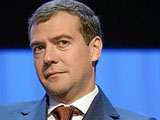Moscow eyes pan-European security
By Sergei Blagov for ISN
As Moscow's assertiveness is anticipated to continue in 2009, the Russian authorities have come up with an ambitious foreign policy initiative: The Kremlin insists that a new pan-European security treaty, suggested by President Dmitry Medvedev, will help to avoid conflicts like its August war with Georgia, as well as disagreements on issues like US missile defense plans.
While the West has responded coolly to the initiative, Russia argues that Europe lacks a coherent security system and that Russia will be forced to deal with new threats on its own.
Europe is yet to create a system of collective security, open to all and guaranteeing equal security for all, Russian Foreign Minister Sergei Lavrov said in remarks published on 15 December, adding that NATO's eastward expansion continued to create problems for Russia and for Euro-Atlantic policies.
Other officials were less diplomatic, indicating that Russia's traditional fears of western encirclement remained on the agenda.
Oleg Morozov, first deputy speaker of the State Duma (Russia's lower house of parliament), said on 15 December that Russia should modernize its armed forces in order to face the threat of NATO's eastward expansion.
Russia would be prepared to use nuclear weapons to defend itself, according to the Russian military doctrine approved in 2000. In January 2008, Russia's then-Chief of General Staff Yuri Baluyevsky pledged to use nuclear weapons and pre-emptive strikes to protect the country. Earlier this month, Baluyevsky, now deputy Security Council secretary, announced he had been ordered to work out a new draft of the Russian national security doctrine, to be approved in February.
Russia also has pledged to develop its nuclear deterrent next year, and will do its best to evolve its strategic nuclear forces, General Nikolai Makarov, chief of General Staff of the Russian Armed Forces, said on 16 December. He also said that the Russian Strategic Missile Forces would include five mobile divisions and four silo-based divisions.
Earlier this month, Makarov argued that the General Staff viewed Russia's tactical nuclear weapons as a deterrent against what he described as "huge amounts of weapons in Europe." He also disclosed plans to create an Aerial-Space Defense Command – an apparent reference to perceived US plans to deploy weapons in space.
Russian military officials insist the country's nuclear deterrent will be further developed to counter the US missile defense plans. The development plans include the deployment of new inter-continental missiles capable of overcoming the US missile shield, Russian Strategic Missile Forces Commander General Nikolai Solovtsov said on 1 December. He also said the Strategic Missile Forces aimed to hold 13 missile tests in 2009.
Russian officials also criticized Europeans for their support of the US missile defense and space-related plans. On 10 December, while on a visit to China, Russian Defense Minister Anatoly Serdyukov accused the US and the EU of blocking the joint Russo-Chinese initiative to ban weapon deployments in space.
While the global financial crisis inevitably dominates the economic risk outlook for next year, the economic situation in Russia and the prospects for 2009 remain negative. And weakening economic fundamentals have the potential to undermine Moscow's political and economic confidence, including an ambitious weapons modernization program for 2007-2015, which is estimated to cost up to US$200 billion.
Nonetheless, Russian authorities insist that its military modernization programs remain on track despite the ongoing financial turmoil. In early December, Russia announced plans to spend an extra 60 billion rubles (US$2.2 billion) in 2009 on weapons, including modernizing short-range Iskander missiles that could counter the planned US missile defense facilities.
As such, the Kremlin is not expected to ease its opposition against US missile defense plans in Europe for 2009. Expect Moscow to continue pursuing an informal grouping of Russia, China and India, with the latest addition of Brazil (BRIC), in an apparent bid to challenge the West. In early December, Russia announced plans to hold a first full-scale BRIC summit meeting in Russia in June 2009.
Moscow is expected to continue flexing its muscles internationally well into 2009, despite some initial signs of economic problems. Yet it remains to be seen whether the Kremlin's strong rhetoric, notably talk of nuclear deterrence, as well as continued focus on non-western groupings, could prove instrumental in achieving its stated goals of revising the security arrangement in Europe.

